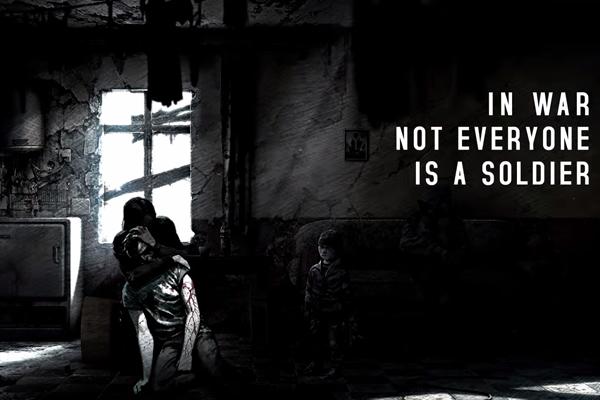The Call of Duty Goes Unheard
This War of Mine was my PAX Prime 2014 game of the show.
Now that we've got that out of the way, allow me to explain exactly why I think that. This War of Mine is a sort of "what if?" story of my life, your life, your friend's lives, your family's lives. In this story, the place known as "home" by the aforementioned is a warzone. While direct fighting may not always be happening where you stand, it's all around you. Food is hard to come by, resources are scarce, and shelter is relegated to a bombed-out home. It's not holding out too well, either. That should be plenty of motivation to go scavenge for supplies, but like real life, it's not that simple.
In my demo, I was set up with the game, and then left alone to figure things out. There was no tutorial to teach me how to learn the mechanics of the game, and that's the point; This War of Mine puts you as a civilian into a small group of other civilians with the simple objective of "survive". Unlike a game like Don't Starve, however, where survival is a simple concept to grasp (and a difficult one to handle), This War of Mine is more like a handful of fleeting concepts of survival, and the many things standing in the way of that hollow victory. That's not a bad thing, either.
The 2D presentation of This War of Mine shows your entire hideout during the day. This is the time in which you can prepare food, build structures such as beds, tables, cooking appliances, and prepare your survivors for the night. At night, things get interesting, as you can have your survivors guard the base from bandits, get some rest (if they're particularly tired), or scavenge. Scavenging is This War of Mine‘s bread and butter; without scavenging, your hungry and sick survivors will die. Without scavenging, there is no conflict. Without scavenging, you have no chance.

So I send one of my survivors out to scavenge. In his civilian life, he was a professional American football player, so he has naturally high stamina and speed. While I initially snuck around, looking for possible hostiles, I found nobody in the bombed-out crag. Lots of canned food and building resources were strewn about the facility, and I returned him to the rest of the group with loaded pockets. I directed another one of my survivors to begin cooking a meal, as his most notable trait was his cooking skill. That sounds pretty boring, but when you're trying to take care of a group of half-starved non-military types, something as simple as being able to cook a satisfying meal goes a long way towards keeping everyone's spirits up. Things as simple as books and guitars help even more in the pursuit of happiness.
What did not help with morale was theft. And boy howdy, did I not intend to steal from those people. But I did. Scavenging is almost always a lose/lose scenario — things may look bad before you walk in, but once you're inside, it takes on a whole other identity. If you've played Mark of the Ninja on its new game plus mode, you'll understand what I mean when I say "your field of view is limited". If you don't have line of sight to something, you can't see it. This means you have to rely on peeping through keyholes, checking for sound occlusion (which hints at the presence of people, hostile or not), and moving quietly to avoid generating noise to be tracked by. On my second scavenging attempt, I didn't notice anyone for quite some time. I got reckless and jogged into a room to find a small group of very scared people who started calling me a "thief" and ran away shouting "don't hurt me!"
It feels odd to say "I felt guilty for stealing from these people" in the context of a video game, but I did. And so did the survivor I had directed to do the stealing. I checked his bio (which shows information about the survivor), and he had grown depressed due to stealing from those harmless people. He noted "it's them or us", but how he later behaved showed he was not the same person. The rest of the group knew he had done it, and while they didn't do anything to him for it, they were also distraught. This kind of emotional recognition is a key element to This War of Mine, with events such as the loss of a survivor, one survivor killing a scavenger, theft, or being stolen from all affect the psyche of your group. Some more than others, but nobody leaves without scars.
Rhys Egner is a writer for Front Towards Gamer from Seattle. He likes comics, hates crowds, and loves gaming of all kinds.









